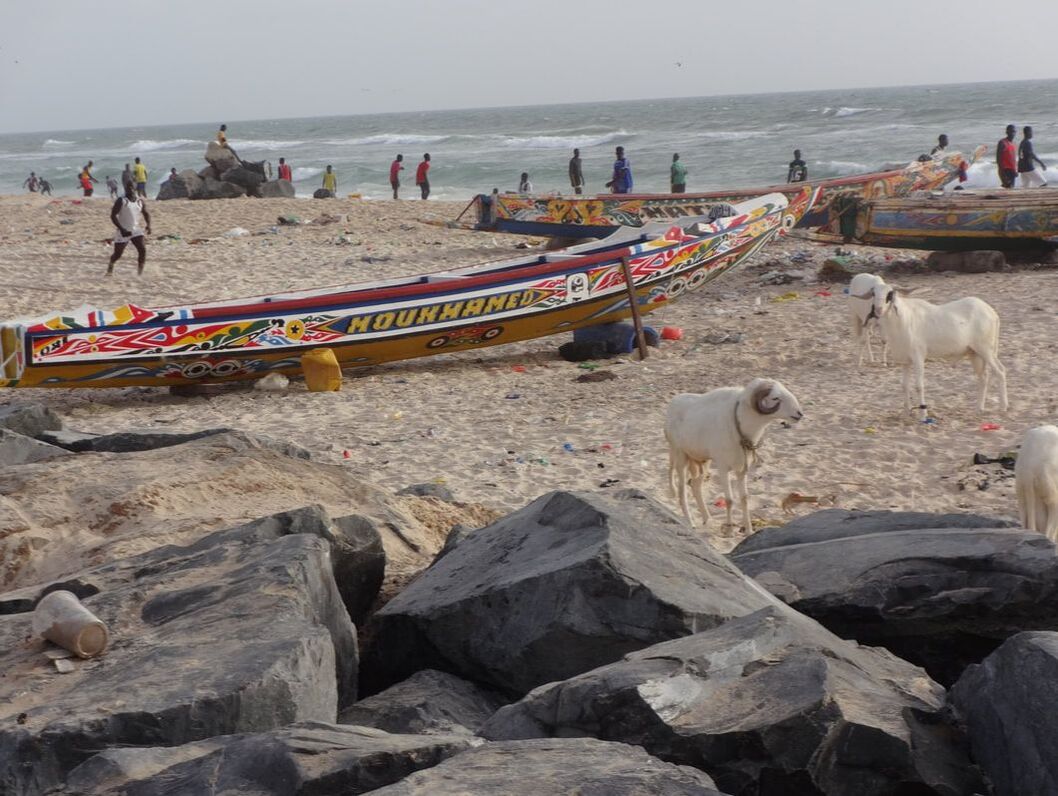|
|
|
As a scholar of migration who had spent several years doing research in Berlin, I have always been interested in the question of displacement in West Africa. I had met many migrants who had arrived from West African countries such as the Gambia, Senegal and Guinea-Bissau in Berlin. It is a well-known fact that significant numbers of people risk perilous journeys to reach Europe. Hence, in collaboration with two researchers I decided to conduct a study in Senegal in order to find out how, why and to what extent small-scale fishers become displaced. Prior to undertaking the research, I had visited Senegal for a holiday and had acquired a fair idea of some of the socio-political issues in the country.
We were fortunate enough to receive some small-scale funding from centres such as MIDEX and C4Globe. We were also fortunate to connect with an interpreter/research assistant in Senegal who spoke English, French and Wolof and assisted us with methodological approaches, conducting interviews and with transcription. He had friends and family in all three of the villages where we did our research, and we had several follow-up questions even after the interviews were conducted. As researchers from the Global North we were aware of our privileged positions, but at the same time the two European-based researchers originated from Nigeria and Pakistan which had a bearing on some of the power dynamics.
As part of our study we learned that since the early 2000s European states such as France and Spain, and Asian countries such as China and South Korea, began to fish extensively in the Senegalese sea where artisanal local Senegalese fishers had been fishing for generations. These industrial fleets have continued to rise and numbered up to 152 vessels in 2017 (Belhabib 2019). This rise has been noted by scholars, some of whom have linked the activities of foreign fleets to the depletion of fisheries and marine resources in Senegalese waters.
Our Identities article, 'Displacement at seascapes: Senegalese fishermen in between state power and foreign fleets', subsequently focused on the adverse effects of these unregulated fishing and plundering of the Senegalese waters from the perspectives of local fishermen and their understanding of the notion of displacement. We demonstrate how displacement manifests in different forms in the lives of artisanal fishers such as economic, temporal and geographical movement. More significantly, the article highlights the perspectives of local Senegalese fishers who view the actions of Western and Asian superpowers, often in union with the national authorities of weaker low and medium income (LMIC) states — in this case Senegal -- as playing an instrumental role in the displacement of the working poor. The fisher folks call the fleets saxaar, meaning ‘smoke’ in the Lebou dialect, because of the balls of black smoke they puff into the sky. According to the fishers, saxaar plunder the seas, ridding the town of their single most valuable resource: fish. Thus, in our article we conceptualized displacement of local Senegalese fishermen as the product of an active, arguably deliberate process, solely motivated by corporate gains to the detriment of communal and human life. The literature on displacement and extractivism has recognized the fact that extractivism and neoextractivism offers very little economic advantages to local communities, and instead pushes these communities into precarity and unemployment, resulting in multiple forms of displacement (see Gudynas 2013; Frynas and Manuel 2006). Consequently, extractive environments have been understood as not politically and ecologically neutral (D’Angelo 2012), but have been recognized as spaces charged with a range of political, economic, ecological and social interests. However, we noted that there was a dearth in scholarship which explicitly demonstrate how extractive economies come to depend upon displacement of people in local fishing communities in Senegal.
Image credit: Photo by Fazila Bhimji
Blog post by Fazila Bhimji, Independent Scholar, Berlin, Allwell R. Uwazuruike, University of Central Lancashire, UK and Mamadou Ba, Virtual University, Senegal
Read the Identities article: Bhimji, F. Uwazuruike, A. and Ba, M. (2022). Displacement at seascapes: Senegalese fishermen in between state power and foreign fleets. Identities: Global Studies in Culture and Power. DOI: 10.1080/1070289X.2022.2161743
Read further in Identities:
Displacement, emplacement and migrant newcomers: rethinking urban sociabilities within multiscalar power Local realities and global possibilities: deconstructing the imaginations of aspiring migrants in Senegal Unexpected places: land, words and silence in a Mapuche family trajectory of (dis)placement Comments are closed.
|
|
Explore Identities at tandfonline.com/GIDE |
|
The views and opinions expressed on The Identities Blog are solely those of the original blog post authors, and not of the journal, Taylor & Francis Group or the University of Glasgow.


